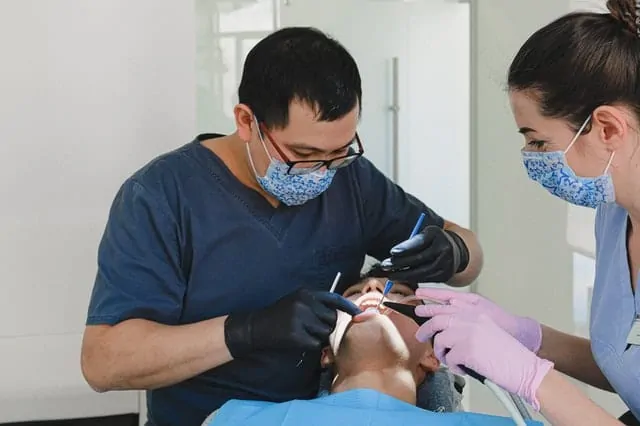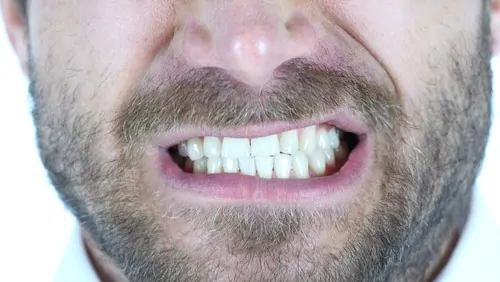Blog
How Cancer Treatment Affects Your Mouth

As we head into the month of October, we tend to see pink ribbons everywhere in support of breast cancer research and breast cancer patients. Cancer is one of those scary words nobody wants to hear, and it can cause feelings of uncertainness and weariness of what treatment will bring. While there are sure to be many thoughts racing through your mind following any cancer diagnosis, there’s one thing you may not immediately think of — seeing your dentist in Douglasville. However, this visit, and follow up visits, can actually help make cancer treatment more successful.
Chemotherapy
The cancer treatment we tend to be most familiar with is chemotherapy. Chemotherapy has been used for many years and can help kill cancer cells. However, it certainly doesn’t come without side effects. While these side effects can affect any area of the body, there are certain ones that directly affect the mouth. Sometimes these side effects are so serious that your medical team may decide to temporarily stop treatment until the side effects are resolved. To help avoid this, it’s important to see your dentist in Douglasville prior to starting chemotherapy.
Chemotherapy and Oral Health
As we’ve mentioned, chemotherapy can be really effective at killing cancer cells. But it can also harm healthy cells in the process, including cells in the mouth. This damage can affect any part of your mouth from your teeth to the soft tissues such as your gums and the glands that create saliva. Some common oral health side effects of chemotherapy include:
- Pain with eating or talking
- Difficulty swallowing
- Dry mouth
- Sores or ulcers
- Peeling, burning tongue
- Infection
These side effects can happen to anyone, and they do tend to vary from person to person. Make sure you talk with your cancer treatment team as well as your dentist in Douglasville during treatment so any side effects are caught and treated early. If they’re not, some infections or side effects can be so severe they’ll cause a delay or pause in your cancer treatment.
The Importance of Regular Dentistry
Seeing your dentist every six months is recommended for everyone, but those undergoing cancer treatment may need to visit more often. After all, your dentist in Douglasville is a key part of your cancer treatment team, and seeing them regularly can help avoid or keep serious side effects at bay. Additionally, if you see your dentist before treatment begins, you can rest assured that you’ll start treatment with an already healthy mouth, reducing the risk of complications. If you or a loved one have been diagnosed with cancer, schedule an appointment with your dentist, ideally one month prior to beginning treatment.
How to Fix a Gummy Smile

Having a gummy smile can affect someone’s self-confidence, and if you’re someone who sees more gum tissue than teeth when smiling or talking, you may know exactly what we’re talking about. In fact, it’s not uncommon for your dentist in Douglasville to hear patients say they’re embarrassed by their smiles, and some even avoid smiling as much as possible because they’re so worried about their appearance. This is no way to live, especially when there are treatments available to fix a gummy smile.
The Best Way to Fix a Gummy Smile
If you’ve been bothered by your gummy smile for a while, you may have been searching for a solution for quite some time. But fixing a gummy smile isn’t as easy as a one-size-fits-all solution. Your dentist in Douglasville will first need to perform an exam and oftentimes x-rays and other photos in order to get an accurate picture of what’s causing your gummy smile and determine the best way to fix it. Depending on your specific situation, some of the potential treatments to fix your gummy smile may include:
- Scaling & Root Planing
Sometimes a gummy smile is caused by an infection of the gum tissue. This infection can cause gums to become swollen and inflamed, covering more of your white teeth than you’d like. If this is the case, your dentist in Douglasville will most likely want to start with a deep teeth cleaning called scaling and root planing. A scaling and root planing treatment removes bacteria up under the gum line and can help remove infection, inflammation, and the gummy look. However, if this treatment alone doesn’t resolve the infection or give you the appearance you’re looking for, additional gum disease treatment or cosmetic dentistry treatment may be appropriate. - Gum Lift & Crown Lengthening
Many times a gummy smile is the result of the way our teeth erupted, and genetics may be to blame. As our adult teeth are forming and erupting, sometimes there’s just too much gum tissue covering the teeth. The good news is often there’s healthy enamel hiding just under the gum overgrowth all we have to do is uncover it. This is when a gum lift or crown lengthening comes into play. A gum lift procedure does exactly what it sounds like — lifts and removes the excess gum tissue to reveal more of each tooth. Now, when there’s an overabundance of tissue, your dentist may recommend a crown lengthening. This procedure removes and restructures the gum tissue as well as the bones around the teeth. The result of both procedures is fewer gums and more teeth. - Lip Lowering
Another likely cause of a gummy smile is a hyperactive upper lip which occurs when the muscles of the upper lip are too active. This can cause the upper lip near the nose to protrude up too high and show off more of the gums than normal. The best way to fix a hyperactive upper lip is through lip lowering treatment. During this procedure, a small section of the gum tissue under the upper lip is removed, and then the remaining top and bottom are reconnected, ultimately shortening the lip and making it impossible for the upper lip to rise as high as it used to. - Orthodontics
Orthodontics, including traditional metal braces as well as invisible aligners such as Invisalign and ClearCorrect, may also be the best way to fix a gummy smile, especially if you have a bad bite. You see, a bad bite occurs when the top jaw and bottom jaw don’t align properly. This can cause several oral health problems, including jaw pain, and when the top jaw protrudes out farther than it should, a gummy smile. Fixing the bite can resolve a gummy smile and give you super-straight teeth at the same time — bonus!
Nobody should have to live a life where they are embarrassed to smile and laugh. They should feel confident about the way their smile looks so they can truly share their emotions with the world. If you’re embarrassed by your gummy smile, don’t wait any longer. Schedule an appointment with your dentist in Douglasville today and start living a life full of confidence and smiles!
Why Do Our Teeth Fall Out?

There’s a myth out there that says we’re almost guaranteed to lose some of our teeth as we get older. But a study by the American Dental Association says otherwise. In fact, more adults are keeping more of their natural teeth longer now than ever before. But that doesn’t ultimately mean that we’re all safe from tooth loss. Join your dentist in Douglasville as we take a closer look at some of the main reasons why our teeth fall out, some of which have nothing to do with age.
Periodontal Disease
Periodontal disease, also known as gum disease, accounts for 70% of all adult tooth loss in America and is the main reason our teeth fall out. Gum disease is an infection of the gum tissue that can damage both the gum tissue and the jaw bone that hold our teeth in place. While anyone can develop gum disease, it does tend to affect older Americans more. For example, a little over 8% of Americans between the ages and 20 and 64 have gum disease compared to 17% for those over 65. The best way to combat the side effects of gum disease is to seek treatment from your dentist in Douglasville early.
Cavities
Cavities are something that affects over 91% of Americans at least once in their lives, and they’re usually just a minor inconvenience. However, as with many things related to our health, if a cavity isn’t treated while it’s still small it can lead to other, more complex problems. As a cavity grows larger and deeper into the tooth, it will start to affect the tooth’s pulp, roots, and nerves. This can be painful and may require root canal treatment or tooth extraction and therefore, the loss of a tooth.
Accidents
Our teeth can also fall out as a result of an accident. Many times these accidents occur from playing sports without a mouthguard but can also happen because of a fall, car accident, or other unexpected mishaps that involve trauma to the mouth. While nobody ever anticipates an accident and you can’t necessarily prevent them from happening, you can (and should) wear a mouthguard when playing sports.
Other Causes
Believe it or not, there are some reasons our teeth fall out that seemingly have nothing to do with our mouths. You see, there are several whole-body health problems that cause problems throughout the body as well as in the mouth, including tooth loss. Make sure you tell your dentist in Douglasville your entire health history, so they know if they need to pay extra special attention to your oral health. Some of the most common health problems associated with tooth loss include:
- High Blood Pressure
- Diabetes
- Smoking
- Poor Nutrition
- Arthritis
As we grow up, we do not need to simply accept the fact that we will lose our teeth. We can take matters into our own hands and actively work to protect our smiles for life by brushing and flossing our teeth every day, eating a well-balanced diet, avoiding tobacco use, and of course, seeing your dentist in Douglasville every six months.
Top 4 Things That May Explain Your Discolored Teeth

Does your smile appear dull, dingy, and discolored? You’re not alone. In fact, Americans spend over a billion dollars on smile whitening products every year because they’re unhappy with the color of their teeth. But what if we could better understand what’s causing the discoloration in the first place and, perhaps, prevent it? You’re in luck. Your dentist in Douglasville is here to share the top four things that often cause tooth discoloration and what you can do about them.
- Tobacco
One of the best ways to almost guarantee tooth discoloration is by using tobacco products, including cigarettes, cigars, and smokeless tobacco. Tobacco products contain ingredients such as tar and nicotine that are known to cause staining, so when tobacco is constantly introduced to the mouth, it’s incredibly common to notice yellowing of the teeth. It’s also common for tobacco users to notice brown spots thanks to the natural brown color of the tobacco itself. The best way to prevent tooth discoloration from tobacco is to avoid it altogether, but your dentist in Douglasville can also help reverse discoloration through a variety of smile whitening or cosmetic dentistry treatments.
- Foods & Drinks
Another common explanation behind tooth discoloration is found in our diets and in the foods and drinks we consume. Beverages such as a daily morning cup of coffee or tea, a nightcap of red wine, and soda can all cause teeth to appear brown or discolored. When it comes to foods that can cause tooth discoloration, think of foods that would stain a white shirt — berries, pasta sauce, and beets are all good examples. Additionally, foods and drinks that are highly acidic are known to attack tooth enamel and can cause teeth to appear dull, gray, or yellow. Alternatively, consuming too many sugary treats tends to cause tooth decay which can present itself as dark or brown patches. To decrease your chances of tooth discoloration from foods and drinks, enjoy tooth-staining treats in moderation.
- Tooth Trauma
A car accident, a fall, or a sporting accident can all result in tooth trauma. You’ll probably find it easier to identify this as a cause of tooth discoloration as you’ll be able to link the discoloration to a mouth injury, whereas the other causes occur over time, often without you even realizing it. Tooth trauma usually causes teeth to appear darkened or gray, and this can occur in one or even multiple teeth. The darkening is due to an injury inside the tooth and will require intervention from your dentist in Douglasville.
- Poor Oral Hygiene
Another incredibly common explanation for tooth discoloration is poor oral hygiene. Brushing and flossing your teeth every day helps remove plaque and bacteria buildup and also helps protect teeth against decay. If you don’t remove this buildup regularly and effectively with a proper oral hygiene routine, you may start to notice your teeth take on a yellowish or gray appearance – or you may even start to see orange or green spots on your teeth. To protect your smile, make sure you’re brushing twice a day for at least two minutes each time and flossing once a day.
Of course, it’s also important to see your dentist in Douglasville every six months for a professional dental cleaning. At these appointments, your dental hygienist will remove even more buildup from your teeth that your at-home brushings can’t remove. This further helps keep your pearly whites white and fight off decay.
What Causes Receding Gums?

If you have gum pain, swollen gums, or increased tooth sensitivity, particularly along the gum line, you may be experiencing gum recession. This oral health problem can lead to other issues down the road, including increased tooth decay, sensitive teeth, and even tooth loss. So what exactly causes receding gums, and how is it treated? Your dentist in Douglasville is here to help.
Gum Recession: 101
Let’s first dive into what gum recession is so we can better understand how it affects oral health, what can cause it, and how it’s treated. Gum recession occurs when gum tissue starts to pull away from teeth, exposing teeth roots. Without this protection covering the roots and the inner workings of the teeth, it’s highly likely that tooth sensitivity will increase. Additionally, teeth are at greater risk for decay, cavities, and eventual tooth loss. But that’s not all. Once gum tissue is gone, it’s gone, and there’s no growing it back. However, your dentist may have treatment options available to help with gum recession.
Gum Recession Causes
There are a whole host of things that can cause gums to recede, and the cause can vary from person to person and include:
- Gum Disease
- Brushing Your Teeth Too Hard
- Grinding and Clenching
- Trauma
It’s best to talk with your dentist in Douglasville to determine the main cause of your specific case so they can recommend the best gum recession treatment for you.
Treating Gum Recession
Just like there is no singular cause of gum recession, there’s also no singular treatment that’s right for everyone. Your treatment plan will be custom created just for you based on how severe your recession is. Treatment options can include:
- Scaling & Root Planing: The most common type of gum recession treatment is done right in your dentist’s office and is called scaling and root planing. This procedure is similar to a dental cleaning, but the difference is both the tooth and the roots are cleaned during a scaling and root planing. Scaling and root planing helps remove plaque and tartar buildup from up under the gums and from the roots of teeth. You will most likely be numbed for this treatment to help keep you comfortable and relaxed.
- Antibiotics: Another treatment option that is often paired with scaling and root planing is the use of an antibiotic. The antibiotic helps remove any bacteria that may still be hanging around.
- Surgical Treatment: More advanced gum recession may require more advanced dental treatment. Thankfully, there are several surgical techniques that dentists can use to help combat gum recession. This treatment option is not appropriate for everyone, and it’s important to note that just because you have gum recession, it doesn’t mean you’ll need surgery. The best to find out how to treat gum recession is to talk with your dentist in Douglasville.
Receding gums may sound scary, but try not to worry. Besides having several treatment options to choose from, there are also things you can do to prevent gum recession from happening in the first place, and most of them are easy. Make sure you brush and floss every day and make sure you’re brushing using a soft-bristled toothbrush and gentle, small circles. Lastly, see your dentist in Douglasville twice a year to further protect your oral health.
Does Drinking Water Benefit Oral Health?

Everyone knows that it’s important to drink plenty of water every day to keep our bodies well hydrated. In fact, this small step of drinking enough water can greatly benefit overall health. Proper hydration is important to help organs function properly, help fight off infections, and may even assist with weight loss. However, your dentist in Douglasville wants to share a few more reasons why you should choose water — and plenty of it.
Better Breath
Believe it or not, drinking water and keeping your mouth properly hydrated is one of the best ways to combat bad breath. Bad breath can often be a side effect of dry mouth, an oral health problem whose name describes it perfectly. Dry mouth may be caused by certain medications, mouth breathing, or simply not drinking enough water. While dry mouth may seem like no big deal, it’s especially concerning for your dentist in Douglasville, You see, our mouths need water to produce saliva, but when we’re dehydrated and experiencing dry mouth, saliva production slows or stops completely. That’s when problems arise. Without saliva, there is nothing to help rinse away leftover food particles or mouth bacteria that can contribute to bad breath.
Cleaner Mouth
When we choose to drink water over sugary beverages such as soda, juice, or sports drinks, we’re not only hydrating our bodies, we’re also helping our mouths stay clean in between brushings. Drinking water, especially when we’re eating, helps to rinse away food particles before they have a chance to linger around and attract bacteria. If not, bacteria will feed on the food particles and release a dangerous acidic byproduct. This acid will attack tooth enamel and leave teeth at increased risk for decay and cavities. Additionally, water is the ideal beverage of choice because it doesn’t contain any sugars. Other sugary drinks may seem to quench our thirst, but the sugars only continue to feed bacteria as opposed to removing their food source.
Stronger Teeth
Whether you drink bottled water or water from the tap, H2O is always the preferred choice for your dentist in Douglasville. However, while bottled water may provide all of the benefits of hydration, it may be missing one key ingredient that you can typically get from tap water — fluoride. Fluoride is a naturally occurring mineral that helps rebuild and remineralize tooth enamel. The process of remineralization strengthens the enamel, making it super strong and super protective against bacteria, acids, and plaque.
Overall Healthier You
Water is one of the most important things that we can give our bodies, yet an estimated 75% of adult Americans don’t drink enough water daily. Consequently, this can lead to negative overall and oral health effects. We need to reverse this habit in order to fuel and protect our bodies. But where do you start? A good rule of thumb to follow is to drink at least eight 8-ounce glasses of water every day, more if you exercise or sweat, and more especially during these summer months.
Why Men Are at Increased Risk for Oral Health Problems

Every June is recognized as Men’s Health Month and strives to bring awareness to just how important it is for men to keep up with doctor appointments, physicals, and routine procedures based on age. It’s also a time for your dentist in Douglasville to encourage all men to seek regular dental care. After all, men are less likely than women to see the dentist regularly as well as keep up with routine doctor visits, both of which can protect their overall health and wellbeing.
Prevention is Key
Your dentist in Douglasville knows just how important it is to get a dental checkup at least every six months. These visits are crucial to monitoring oral health as well as giving each and every patient a professional cleaning that helps remove stuff from your teeth and gums that you simply can’t touch at home. However, according to the Academy of General Dentistry, men are less likely to schedule and complete these preventive appointments and instead only see the dentist when they’re experiencing a problem. For this reason alone, men are at increased risk for oral health problems, some of which can be pretty serious and include:
- Gum Disease. Gum disease is a serious infection that occurs in the gum tissue of the mouth. If not treated quickly and effectively, it can lead to tooth loss and a whole host of other whole-body problems. In fact, numerous studies have shown a connection between gum disease and the increased risk of heart disease, certain cancers, respiratory problems, and poor prostate health in men. Additionally, men are at greater risk of developing gum disease than women. According to The American Dental Association, around 34% of men ages 30-54 have gum disease as compared to 23% of women in the same age range.
- Oral Cancer. Another serious oral health condition that tends to affect men more than women is oral cancer. Oral cancer can occur in any of the soft tissues in the mouth, including lips, tongue, and cheeks, as well as in the throat. Men are two times more likely to get oral cancer than women and four times more likely to develop oropharyngeal cancer, cancer that affects the way back of the mouth. It can be treated with early intervention, but when it’s not caught early, it can spread to other areas of the body and may lead to death. This is just another reason why seeing your dentist in Douglasville every six months can help protect your overall health.
- The Need for Advanced Dental Care. Since men tend to avoid preventive dental appointments, they’re at increased risk for the need for advanced dental care. Just like most things in life, when a dental problem is left untreated, the solution is often more complicated than it would have been if caught earlier. What may have been a small area of decay a few months ago may now be a deep cavity, and the treatment can vary greatly. In the early stages, decay can usually be treated with a minor filling. However, if the decay infects too much of the tooth it may require a root canal and perhaps a dental crown. If decay is left alone for even longer, it may cause pain and require a tooth extraction, which should then be replaced with a dental implant or dental bridge. So while preventive dental appointments may seem unnecessary, if nothing is wrong, there can be problems lurking just below the surface that can be fixed immediately and easily before they cause problems and require advanced dental treatment.
Lifestyle Factors Play a Role
Besides skipping out dental appointments every six months, men are also more likely to engage in lifestyle factors that also increase the risk of oral health problems such as:
- Smoking or using smokeless tobacco
- Drinking alcohol
- Having poor oral hygiene habits
While it’s important for everyone to see their dentist in Douglasville every six months, men tend to need a little extra encouragement. So for this Men’s Health Month, and every month, we invite men to break the mold and schedule an appointment. Your mouth, and your overall health, will thank you for it.
“Why Is My Tongue a Different Color?”

Usually you’ll find your dentist in Douglasville spending most of their time talking about teeth. But today, we’re switching it up a bit and focusing on another important area of oral health — the tongue. This amazing muscle helps us speak, chew, and swallow, but did you know that our tongues can also help your dental team identify oral health problems- or even other whole-body problems? Say “Ah!” and let’s take a look at some ways our tongues can be the window to overall health.
A Bright Red Tongue
Tongues are usually a nice shade of pink — this indicates a well-hydrated and healthy tongue. But there are also times when patients look in their mouths to find a bright red tongue. The color can be so dramatic that it can appear as if you just ate a red popsicle that stained your tongue. A red tongue is often referred to as strawberry tongue and can indicate a vitamin B-12 deficiency or an iron deficiency. Occasionally, a red tongue may also be a sign of a fever, strep throat, Kawasaki disease, or erythroplakia. Erythroplakia may increase the likelihood of developing oral cancer, so any tongue redness that doesn’t go away warrants a call to your dentist in Douglasville.
Scalloped or Wavy Edges
If it’s been a while since you’ve last looked at your tongue, you may now notice changes in its texture, particularly a scalloped or wavy appearance along the edges. This is usually nothing to be concerned about but can be a sign of other problems. Scalloped or wavy edges often result from the tongue being pushed up against the teeth repeatedly. This can even happen during sleep! This change in tongue texture can also be a sign of teeth grinding, sleep apnea, TMJ disorder, or vitamin deficiencies.
A Black, Hairy Tongue
As gross as this sounds and as scary as it can be, usually a black, hairy tongue isn’t anything to worry about. This condition can be caused by poor oral hygiene, smoking or chewing tobacco, drinking too much alcohol, dry mouth, or changes to yeast or bacteria in the mouth. Also, the “hair” you see isn’t actually hair but rather a buildup of skin cells on the papillae (the tiny bumps naturally found on tongues). When too many cells take over the papillae, they can appear long and hair-like as opposed to small bumps. This condition can resolve on its own.
Painful Sores or Bumps
As we’ve mentioned before, all tongues have tiny bumps called papillae. Those are normal and are no cause for concern. However, when a new bump appears and is accompanied by pain or soreness and doesn’t go away, you should visit your dentist in Douglasville. New lumps that don’t go away over the course of two weeks may be a sign of oral cancer. Oral cancer can be treated, but treatment is often more successful when the cancer is caught early. Call your dentist as soon as you can to get it checked out.
Your tongue can say a lot about your overall health, and it shouldn’t be ignored. Keep a close eye on your tongue in-between your dental appointments and be sure to talk about any changes you may notice with your dental team.
How Stress Can Affect Oral Health

Stress can be caused by any number of things, such as work and family. But in these uncertain times, it’s only natural to experience elevated levels of stress. Too much stress can have negative effects on bodies such as headaches, stomachaches, increased heart rate, and overall feelings of anxiety. But your dentist in Douglasville also wants you to know that high levels of stress can also affect your oral health. Let’s examine a few ways in which this happens, as well as what you can do to help protect yourself.
- Jaw Pain & Discomfort
Your jaw joint, or your temporomandibular joint (TMJ), is one of the main areas where stress can affect your oral health. When we’re overly stressed, we tend to have a subconscious response that causes us to clench or grind our teeth repeatedly. This constant pressure on both the teeth and jaw muscles can lead to jaw pain as well as damage to teeth. Over time, if the clenching and grinding continue, you may develop TMJ disorder. This often painful condition is usually accompanied by jaw popping or clicking or even a locked jaw. It’s best to see your dentist in Douglasville when you start experiencing these symptoms.* - Canker Sores
Many of us have experienced the discomfort of the canker sore or other similar sores in our mouths. These sores often resemble ulcers and can be white or red spots or lines. While there is no definite cause of a canker sore, studies conducted by the Academy of General Dentistry support the hypothesis that canker sores can occur more often in those who undergo prolonged periods of stress. Canker sores can be annoying and a little bit painful, but they aren’t contagious. - Gum Disease
One of the most common dental diseases that affect Americans is gum disease. Typically, the cause of gum disease is poor dental hygiene or smoking. But there have been recent studies that suggest a connection between stress and gum disease. It’s also important to know that this oral health disease doesn’t only increase the risk of problems in the mouth, such as tooth loss, it can also contribute to problems throughout the body. Gum disease has been linked to overall health conditions such as heart disease, respiratory disease, and some cancers. Some signs of gum disease include bleeding while brushing or flossing, chronic bad breath, or swollen gums. If you notice any of these, call your dentist in Douglasville.*
Reduce Your Stress, Reduce Your Risk
Reducing stress levels can go a long way in protecting both your overall health as well as your oral health. While everyone is different and stress-management techniques can vary in effectiveness from person-to-person, there are a few trusted tips health professionals recommend.
- Sleep. Getting enough sleep every night can help our bodies recover and lower stress. If you have trouble falling asleep, try to avoid blue light an hour before bed, listen to calming music or sounds, and follow a regular routine of waking up the same time every day.
- Exercise. Whether you decide to go for a walk, dust off your yoga mat, or follow a workout video, make sure you do some sort of exercise every day. Physical activity can release endorphins and can decrease stress.
- Breathe. Simply focusing on your breathing or practicing daily meditation can do wonders in lowering blood pressure as well as stress. Take a few minutes every day to focus on deep breathing exercises or try out an app that guides you through a meditation session.
During these uncertain times, we’re bound to feel stressed out occasionally. Make sure you focus on identifying when you’re feeling this way and practice lowering stress levels to help keep your body, mind, and oral health in good shape.
*At the time of publishing, the ADA recommends that all preventive dental appointments and non-emergency consultations be postponed. Please check with your local regulations.
3 Ways to Wear Off Novocaine

You know the feeling — you just had your appointment, and your dentist in Douglasville used novocaine to help make your treatment more comfortable. But now that you’re out of the chair and back at work, you can’t talk correctly, every time you take a sip of water it drips down your face, and you certainly can’t smile fully when half of your face is numb. Don’t worry, there are a few ways you can make the effects of novocaine wear off fast.
How Does Novocaine Work?
Before we understand how to reverse the numbness of novocaine, we need to know what it is and how it works. Novocaine is a local anesthetic that eases pain around the areas where it’s administered. While the chemistry behind novocaine is complex, the basics are easy to understand. Novocaine essentially blocks your nerves from sending pain signals to the brain, therefore making treatment comfortable and virtually pain-free. Your dentist in Douglasville may use novocaine prior to dental treatments such as:
- Fillings
- Root canals
- Extractions
- Cosmetic dentistry procedures
How Long Does Novocaine Usually Last?
This is a tough question to answer as the effects of novocaine can vary in duration based on how much your dentist uses for your specific body and procedure. Usually, novocaine will numb your tooth for about 1-2 hours. But that doesn’t mean the numbness immediately subsidies after that. The effects of novocaine can last for 3-5 more hours after you leave the dental office.
How to Wear Off Novocaine Faster
Don’t have an additional 3-5 hours to wait until you regain feeling in your lips and face? There are things you can do to help make the numbness wear off faster.
- Massage the Area. If your procedure wasn’t serious and you aren’t experiencing any pain or swelling, you can try gently massaging the area to increase blood flow. More blood into the affected area can help bring feeling back quickly. However, you should avoid touching the actual injection site or the treatment area directly, and you should always wash your hands prior to touching your lips, mouth, or face.
- Do Something Physical. Similarly to massage, getting your blood pumping by doing some physical activity can also help the numbness disappear faster. You can take a walk, hop on a bike, or perhaps even go for a run. Whatever your exercise of choice is, make sure you get your dentist’s approval before you jump into strenuous activity.
- Apply a Warm Compress. Applying heat to any part of our bodies will also increase blood flow, again perhaps helping novocaine wear off faster.
Other Novocaine Side Effects
While other side effects of novocaine are rare, they are possible and include:
- Dizziness
- Headaches
- Minor injection site pain
- Muscle twitching
If you experience these side effects, talk with your dentist in Douglasville prior to receiving novocaine.
Novocaine is an incredibly common part of routine dental work and truly helps make treatments easier and more comfortable for you. If you have questions or concerns about novocaine, never hesitate to ask your dental team. After all, we are here to help you get the care you need while keeping you comfortable every step of the way.
